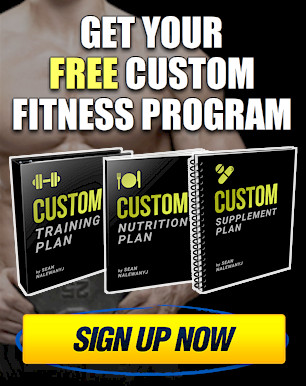THE BEST FOODS TO EAT TO GAIN MUSCLE SIZE
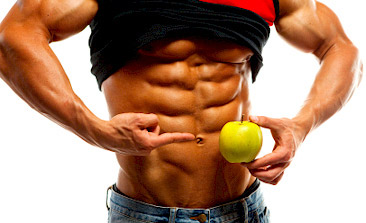
You already know that proper nutrition is crucial to the process of muscular recovery and growth… but which specific foods are the best overall choices for bodybuilders and athletes?
If you want to know exactly what to eat to gain muscle, this article will provide you with a simple and structured breakdown that you can use to formulate your overall diet.
I’ll be separating the food items into 3 major categories: protein, fats and carbohydrates.
Before we get started though, there’s one important thing you need to keep in mind…
Your body does not view your overall nutritional intake within the context of individual food items.
It doesn’t say “that’s a chicken breast”, “that’s an apple” and “that’s a bowl of oatmeal”. All the body sees is the total amount of protein, carbohydrates and fats along with an assortment of vitamins, minerals and other micronutrients.
Yes, there are specific foods that can help you reach your goals more effectively than others, but always keep the big picture in mind.
The total grams of protein, carbs and fats that you consume each day is a far more important factor to pay attention to than the specific foods you use to meet those numbers.
It’s perfectly possible to eat nothing but typical “bodybuilding foods” and get absolutely nowhere if your total macronutrient intake is not within the proper range.
It’s also the reason why it’s completely realistic to consume small amounts of “cheat foods” every single day and still get optimum results. (You may want to check out my previous article on the concept of “If It Fits Your Macros” for more information on that topic.)
So, assuming that you’re adequately hitting your calorie/macronutrient needs, let’s take a look at some high quality food sources you can use to structure your diet with…
What To Eat To Gain Muscle: Protein Sources
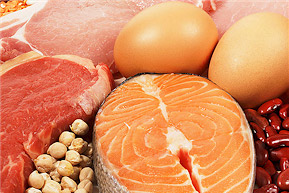
Protein is responsible for building and repairing damaged muscle tissue. Those looking to increase their muscle size and strength should aim for about 1 gram of protein per pound of body weight each day. (Protein contains 4 calories per gram)
The bulk of your protein intake should be derived from foods with the following 3 attributes…
1) High bio-availability: This refers to how much of the total protein content is actually utilized by your body.
2) Favorable amino acid profile: Amino acids are the building blocks of protein and certain amino acids are more effective at supporting muscular recovery and growth than others.
3) Low fat content: There is absolutely nothing wrong with fat, but consume too many high fat protein sources and you’ll quickly over-shoot your daily fat and calorie totals.
In virtually all cases, the types of proteins with all 3 of these characteristics will be derived from animal-based sources.
Here is a list of top quality food sources to make up the bulk of your overall protein intake…
* Chicken
* Turkey
* Lean Steak
* Extra Lean Ground Beef
* Lean Pork
* Whole Eggs/Egg Whites
* Cottage Cheese
* Fish (salmon, tuna, tilapia, halibut, cod, bass, trout etc.)
* Other seafood (shrimp, crab, lobster, scallops etc.)
* Skim milk
* Whey Protein
What To Eat To Gain Muscle: Fat Sources
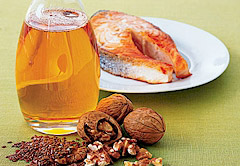
The benefits of proper fat intake are virtually endless and include optimizing hormone levels, supporting brain function, protecting joints and improving cardiovascular health.
About 25% of your total calorie intake should be derived from fats. (Fats contain 9 calories per gram)
There are 2 major categories of fats: saturated and unsaturated. (The unsaturated fats are further broken down into polyunsaturated and monounsaturated fats)
There’s no need to specifically worry about your saturated fat food sources, as that will be taken care of through the animal meats that you consume as well as a few other tag along sources.
Your polyunsaturated and monounsaturated fat intake should be given special attention however.
Here are some fantastic food sources for obtaining your daily “healthy fats”:
* Nuts/Natural Nut Butters (peanut, almond, walnut, cashew, pecan, macadamia, hazelnut)
* Seeds (sunflower, sesame, flaxseed, pumpkin)
* Oils (olive oil, flaxseed oil, sesame oil, peanut oil, sunflower oil, fish oil)
* Fatty Fish (salmon, tuna, mackerel, herring, trout, sardines)
* High Quality Fish Oil
* Avocado
What To Eat To Gain Muscle: Carbohydrate Sources
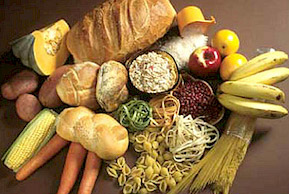
Carbohydrates provide energy to your muscles and brain. After you’ve calculated your protein/fat intake, the remaining calories should be derived from carbs.
There is a ton of confusion regarding carbohydrate intake with uninformed “expert opinions” ranging all over the map.
The only thing you really need to keep in mind when structuring your carbohydrate intake is to get the bulk of your carbs from sources that are:
1) Minimally refined: Carbs that have not been heavily processed are higher in vitamins, minerals and other valuable micronutrients.
2) High in fiber: Fiber delivers a wide array of benefits, particularly for digestive health.
This is not a complete list as there are an endless number of different carb sources you could consume, but here are my top choices…
* Oatmeal
* Rice
* Quinoa
* Potatoes
* Sweet potatoes
* Yams
* Ezekial bread
* Whole grain cereals
* Pita
* Pasta
* Fruits
* Vegetables (Try to get in a few servings of vegetables every day)
As long as the bulk of your carbs are coming from these sources (80-90%), including some other “cheat carbs” (i.e. cookies, sweets, chocolate) to make up the remainder is fine as long as it fits into your overall carb intake.
What To Eat To Gain Muscle: Wrapping It Up
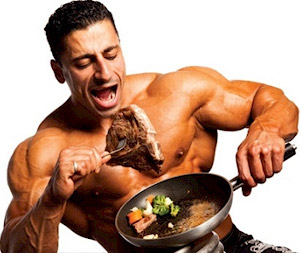
I hope you found this guide useful. You’ve now been given a thorough list of high quality protein, fat and carbohydrate food sources to include in your muscle building diet.
Get your daily calorie/macronutrient totals reasonably nailed down, meet those numbers using the foods outlined in this article, and you’ll be employing a bodybuilding nutrition strategy that virtually cannot fail.
If you found this article helpful, make sure to sign up for your FREE custom fitness plan below...




